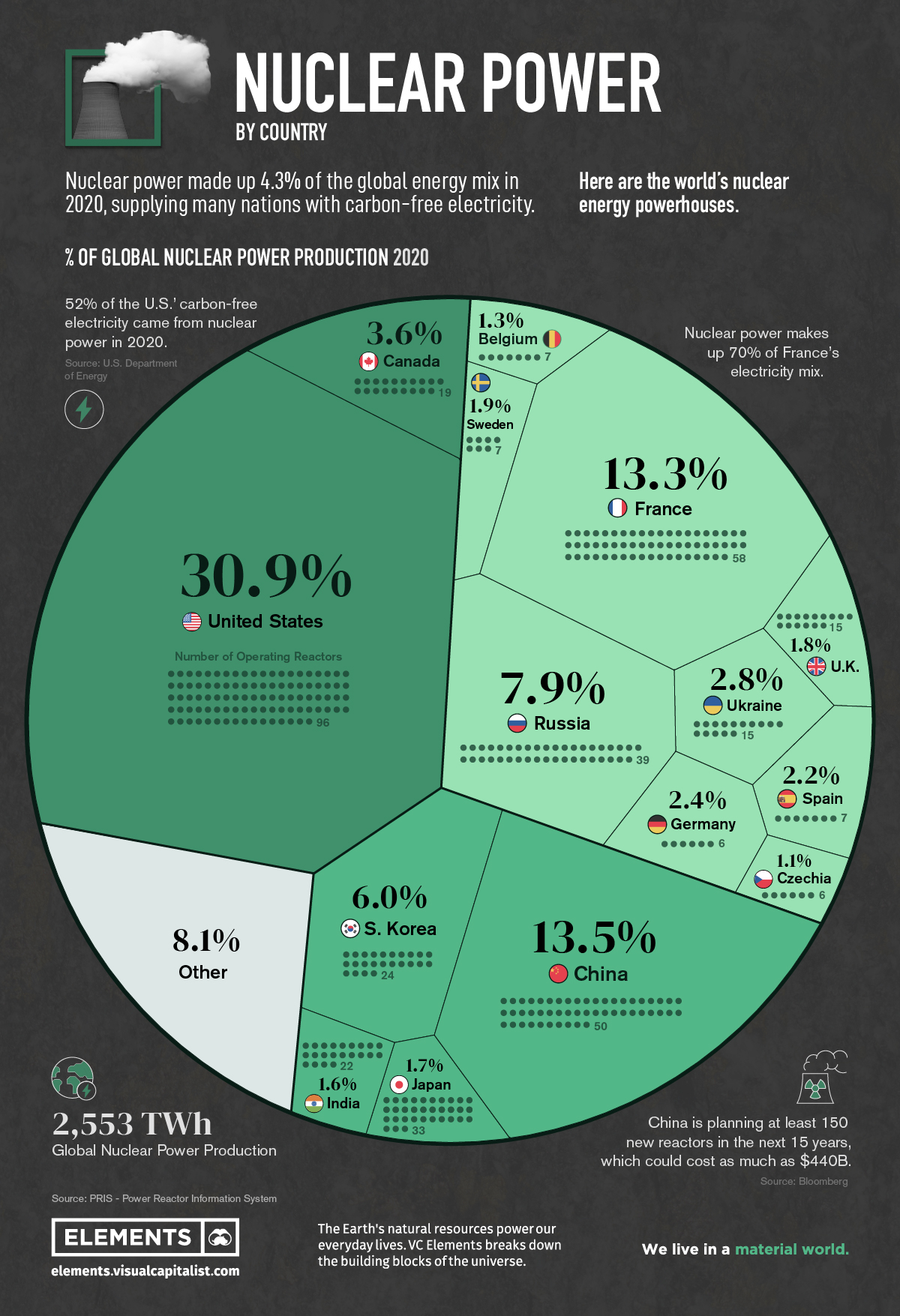A Brief Colonial History Of Ceylon(SriLanka)
Sri Lanka: One Island Two Nations
A Brief Colonial History Of Ceylon(SriLanka)
Sri Lanka: One Island Two Nations
(Full Story)
Search This Blog
Back to 500BC.
==========================
Thiranjala Weerasinghe sj.- One Island Two Nations
?????????????????????????????????????????????????Sunday, January 23, 2022
Ranked: Nuclear Power Production, by Country

Nuclear Power Production by Country
This was originally posted on Elements. Sign up to the free mailing list to get beautiful visualizations on natural resource megatrends in your email every week.
Nearly 450 reactors around the world supply various nations with nuclear power, combining for about 10% of the world’s electricity, or about 4% of the global energy mix.
But while some countries are turning to nuclear as a clean energy source, nuclear energy generation overall has seen a slowdown since its peak in the 1990s.
The above infographic breaks down nuclear electricity generation by country in 2020 using data from the Power Reactor Information System (PRIS).
Ranked: The Top 15 Countries for Nuclear Power
Just 15 countries account for more than 91% of global nuclear power production. Here’s how much energy these countries produced in 2020:
| Rank | Country | Number of Operating Reactors | Nuclear Electricity Supplied [GWh] | % share |
|---|---|---|---|---|
| #1 | U.S.  | 96 | 789,919 | 30.9% |
| #2 | China  | 50 | 344,748 | 13.5% |
| #3 | France  | 58 | 338,671 | 13.3% |
| #4 | Russia  | 39 | 201,821 | 7.9% |
| #5 | South Korea  | 24 | 152,583 | 6.0% |
| #6 | Canada  | 19 | 92,166 | 3.6% |
| #7 | Ukraine  | 15 | 71,550 | 2.8% |
| #8 | Germany  | 6 | 60,918 | 2.4% |
| #9 | Spain  | 7 | 55,825 | 2.2% |
| #10 | Sweden  | 7 | 47,362 | 1.9% |
| #11 | U.K.  | 15 | 45,668 | 1.8% |
| #12 | Japan  | 33 | 43,099 | 1.7% |
| #13 | India  | 22 | 40,374 | 1.6% |
| #14 | Belgium  | 7 | 32,793 | 1.3% |
| #15 | Czechia  | 6 | 28,372 | 1.1% |
Rest of the World  | 44 | 207,340 | 8.1% | |
| Total | 448 | 2,553,208 | 100.0% |
In the U.S., nuclear power produces over 50% of the country’s clean electricity. Additionally, 88 of the country’s 96 operating reactors in 2020 received approvals for a 20-year life extension.
China, the world’s second-largest nuclear power producer, is investing further in nuclear energy in a bid to achieve its climate goals. The plan, which includes building 150 new reactors by 2035, could cost as much as $440 billion.
On the other hand, European opinions on nuclear energy are mixed. Germany is the eighth-largest on the list but plans to shutter its last operating reactor in 2022 as part of its nuclear phase-out. France, meanwhile, plans to expand its nuclear capacity.
Which Countries Rely Most on Nuclear Energy?
Although total electricity generation is useful for a high-level global comparison, it’s important to remember that there are some smaller countries not featured above where nuclear is still an important part of the electricity mix.
Here’s a breakdown based on the share of nuclear energy in a country’s electricity mix:
| Rank | Country | Nuclear Share of Electricity Mix |
|---|---|---|
| #1 | France  | 70.6% |
| #2 | Slovakia  | 53.1% |
| #3 | Ukraine  | 51.2% |
| #4 | Hungary  | 48.0% |
| #5 | Bulgaria  | 40.8% |
| #6 | Belgium  | 39.1% |
| #7 | Slovenia  | 37.8% |
| #8 | Czechia  | 37.3% |
| #9 | Armenia  | 34.5% |
| #10 | Finland  | 33.9% |
| #11 | Switzerland  | 32.9% |
| #12 | Sweden  | 29.8% |
| #13 | South Korea  | 29.6% |
| #14 | Spain  | 22.2% |
| #15 | Russia  | 20.6% |
| #16 | Romania  | 19.9% |
| #17 | United States  | 19.7% |
| #18 | Canada  | 14.6% |
| #19 | United Kingdom  | 14.5% |
| #20 | Germany  | 11.3% |
European countries dominate the leaderboard with 14 of the top 15 spots, including France, where nuclear power is the country’s largest source of electricity.
It’s interesting to note that only a few of these countries are top producers of nuclear in absolute terms. For example, in Slovakia, nuclear makes up 53.6% of the electricity mix—however, the country’s four reactors make up less than 1% of total global operating capacity.
On the flipside, the U.S. ranks 17th by share of nuclear power in its mix, despite producing 31% of global nuclear electricity in 2020. This discrepancy is largely due to size and population. European countries are much smaller and produce less electricity overall than larger countries like the U.S. and China.
The Future of Nuclear Power
The nuclear power landscape is constantly changing.
There were over 50 additional nuclear reactors under construction in 2020, and hundreds more are planned primarily in Asia.
As countries turn away from fossil fuels and embrace carbon-free energy sources, nuclear energy might see a resurgence in the global energy mix despite the phase-outs planned in several countries around the globe.


